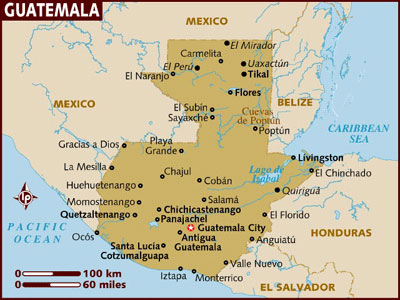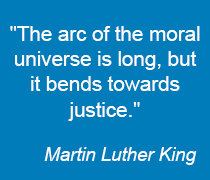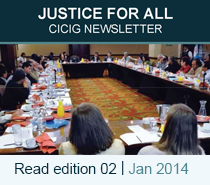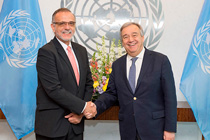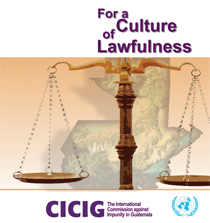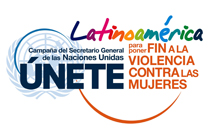 The Republic of Guatemala, a mountainous country that lies in the Central American isthmus, has an estimated population of 13 million people. Guatemala won its independence in 1821, following almost three centuries of Spanish colonial rule. The nation's roots lie in the Mayan civilization, which flourished in Guatemala and the neighboring regions in the first millennium A.D. The diverse demographic composition of Central America's most populous country is a reflection of its Mayan heritage: Mestizo peoples of mixed Spanish and Indian background and peoples of European descent comprise 60% of the population; the remaining 40% are Mayan indigenous peoples.
The Republic of Guatemala, a mountainous country that lies in the Central American isthmus, has an estimated population of 13 million people. Guatemala won its independence in 1821, following almost three centuries of Spanish colonial rule. The nation's roots lie in the Mayan civilization, which flourished in Guatemala and the neighboring regions in the first millennium A.D. The diverse demographic composition of Central America's most populous country is a reflection of its Mayan heritage: Mestizo peoples of mixed Spanish and Indian background and peoples of European descent comprise 60% of the population; the remaining 40% are Mayan indigenous peoples.
Various military and civilian governments controlled Guatemala during the second half of the twentieth century. A violent, 36-year civil war began in 1960 and ended with the signing of a peace agreement between the government and the main guerrilla organization, the Unidad Revolucionaria Nacional Guatemalteca (URNG).
The Civil War
Guatemala's civil war resulted from critical limitations on democracy during three decades of military governments beginning in 1954. At that time, a democratic movement presaged the development of revolutionary armed movements a decade later. The Comprehensive Peace Accords signed in December 1996 brought an end to the war and were the result of six years of UN-sponsored negotiations and an unprecedented opening of civil society.
The origins of the internal conflict—deeply ingrained inequality, ethnic discrimination and the absence of political space for the opposition—continued to fuel the fighting as war became the norm. Starting in the 1960s, a new counterinsurgency policy in the form of state terror and widespread repression sought to quell any form of opposition. The politics of the Cold War played a critical role, as did the United States Government's use of Central America as leverage against the Soviet Union and a means of implementing anti-communist policies through aid and covert operations. These operations have since been uncovered. A UN-backed Historical Clarification Commission (CEH) found that the army committed 93% of human rights violations during the war, including hundreds of massacres of civilians. As many as 200,000 people were killed or disappeared during the war.
The Guatemalan peace negotiations in the early 1990s involved the Government, the guerrilla insurgents, civil society organizations, the United Nations in a mediating and verifying role, and several diplomatically-friendly governments. Negotiations became a platform on which political, economic and social stakeholders competed for legitimacy and pushed their own agendas forward: there were increased opportunities to access the global market, return to military authority and achieve greater political representation.
Democratic forces paved the way for social dialogue, but until the many tangible manifestations of a corrupt justice system were purged from daily life, the political and social opening begun in the 1960s would be unable to produce real results. Rampant urban crime and other signs of underdevelopment and inequality persist in a culture of lawlessness.
The degree of politically-motivated violence and brutality instituted as part of the state's counterinsurgency campaign in the 1970s and 1980s has re-emerged in the form of intense criminality. Public security in Guatemala has reached disastrously low levels. Guatemala has one of Latin America's highest murder rates, with more than 45 homicides per 100,000 people in 2006—eight times higher than that of the United States. The number of murders estimated to occur per day in Guatemala has reached 17, making it one of the most violent countries in the world. The Guatemalan Human Rights Office estimates that convictions are only achieved in approximately 6% of all criminal cases. Of the 626 massacres that occurred during the war, documented by the CEH, only two cases have been prosecuted in Guatemalan courts. A nationwide culture of impunity, and minimal progress on reducing vast socioeconomic inequalities, threaten to undermine the process of democratization that led to a celebrated peace process in the early 1990s.
Guatemala's Failed Public Security Apparatus: Impunity, Corruption and Illegitimacy
The September 1996 peace accord—entitled "Strengthening of Civilian Power and the Role of the Armed Forces in a Democratic Society"—redefined the function of the military in the Guatemalan state and society, and it effectively ended the armed conflict stipulated that the military would no longer have the mandate to increase "national security". This was the doctrine under which the armed forces had developed and carried out the repressive, systemic counterinsurgency since the 1960s. The accord's provisions called for immediate demilitarization, troop reduction and relocation; dismantling of paramilitary groups; and definitive changes to the mission and education of the military. The agreement on human rights—the first substantive accord to be signed—was concluded in March 1994 and called for the immediate creation of UN verification mechanisms to monitor human rights.
Despite the early progress achieved with the implementation of the accords in the military reform and in the operational agreements (including the downsizing of the army, the successful demobilization of URNG guerrilla forces and their reinsertion into society), glaring impunity and corruption have primarily characterized the Guatemalan security system since the 1990s. In December 2006, the Guatemalan Government reached an arrangement with the UN to establish CICIG in an effort to provide a "third-party prosecutor" that intervenes on behalf of victims, clarifies the extent to which illicit armed groups have infiltrated the state, and recommend policies in order to disband such groups. Although CICIG represents an internationally legitimized effort to reduce impunity, genuine change must come from the will of political and civil society forces to reform the national police and the justice system.
The steady rise in crime in Guatemala—and the failure of the state and police to bring perpetrators to justice—has corrupted the standard of living, rule of law and, most significantly, the state's legitimacy in the eyes of the citizens. Security sector reforms are crucial to stability in every part of society: sustainable development, social inclusion and anti-discrimination practices, the eradication of human rights violations and a broader role for legislative and civil institutions. Without the political will required for a genuine commitment to establish law and enforcement it in a just, well-founded fashion (which is crucial to the function and improvement of society), the spirit of the peace accords and the process of democratization are at increasing risk.
Some 5,885 Guatemalans suffered violent deaths in 2006—500 more than in 2005, and a 60% increase since 2003 (BBC 2007). The United Nations Special Rapporteur for extrajudicial killings, Philip Alston, cited a high incidence in Guatemala of gruesome murders of women, lynching in rural areas, prison violence and the country's single-digit murder conviction rate in a February 2007 report on the country's civil and political rights (UN 2007). In addition to pervasive corruption, Alston and other justice system monitors point out a lack of financial resources, insufficient police forces, a problematic division of responsibilities between the military and police, and the constant failure to investigate and prosecute serious crimes. Impunity—Guatemala's most serious and overwhelming problem—must be addressed before citizens can expect progress toward a more equitable and secure society.


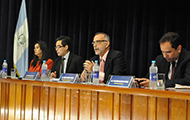
 The Republic of Guatemala, a mountainous country that lies in the Central American isthmus, has an estimated population of 13 million people. Guatemala won its independence in 1821, following almost three centuries of Spanish colonial rule. The nation's roots lie in the Mayan civilization, which flourished in Guatemala and the neighboring regions in the first millennium A.D. The diverse demographic composition of Central America's most populous country is a reflection of its Mayan heritage: Mestizo peoples of mixed Spanish and Indian background and peoples of European descent comprise 60% of the population; the remaining 40% are Mayan indigenous peoples.
The Republic of Guatemala, a mountainous country that lies in the Central American isthmus, has an estimated population of 13 million people. Guatemala won its independence in 1821, following almost three centuries of Spanish colonial rule. The nation's roots lie in the Mayan civilization, which flourished in Guatemala and the neighboring regions in the first millennium A.D. The diverse demographic composition of Central America's most populous country is a reflection of its Mayan heritage: Mestizo peoples of mixed Spanish and Indian background and peoples of European descent comprise 60% of the population; the remaining 40% are Mayan indigenous peoples.